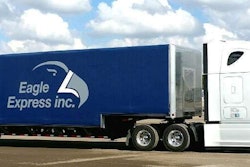
A small note in italics resides under the email signature of Leander Richmond, small fleet owner of Eagle Express Inc. in Canton, Mich. The note is one he put there permanently, “out of aggravation,” he says, after one conversation too many with a broker about his clarification of just what “back solicitation” meant, a common term referring to a practice that many brokers will look to prohibit in carrier contracts in a sort of non-compete clause — to prevent losing shippers’ business to the carrier directly. Here’s what that permanent addition below his email signature says:
Disclaimer: Eagle Express does not recognize shipper- or consignee-initiated contact with the carrier as “back solicitation” and will not honor any claim to the same. Eagle Express will not contact shipper or consignee in an effort or attempt to solicit direct business. as this would constitute “back solicitation.”
It reminded me of a conversation I had with St. Louis-area Cayenne Express’ Bob Christ recently about a similar issue. We were talking about quick-on-boarding online forms that some brokers have moved to of late in order to speed the process up for owner-operators and other carriers in the spot market. Those forms, Christ said, were in some cases advantageous, but where they helped in transactional speed they could also hinder in some cases in the ability to modify the contract. An issue with back solicitation Christ noted as paramount for him in such agreements. “Some things in contracts we like to line-item out,” he says, like the common clause about back-solicitation. Christ sums up his addition this way: “If we had a previous relationship with this customer, it does not apply.” He notes Anheuser-Busch as a shipper Cayenne has done a fair amount of direct business with in his region, but whose loads from facilities far afield also come to the company through brokers from time to time.
With the electronic contracts, “you can’t scratch a line out of it,” he says. “We’ll have to call them and say, ‘You have to take this out’ or ‘put this in.’ They might say, ‘We can’t change it.’ Then it’s like they’re forcing you” to accept something that’s impossible to abide by.
Speaking of frustration, the reason Eagle Express’ Richmond — a specialized carrier with eight trucks and step-deck conestogas — wrote in to begin with had to do with another contractual issue entirely, one that also illustrates the disconnect in some instances between brokerage businesses’ desires and the reality where the rubber hits the road. He recently put TQL on his do not use list, he says, over the issue of detention at non-appointment facilities. I’ve written about the “double-edged sword” of appointment times for load pickup or delivery before, of course, great if you’re “right on time and the facility keeps its appointment ducks in a row,” as I wrote previously. If you’re early, though, or late, that appointment system might well be a big thorn in your side.
Richmond’s frustration was with the opposite, however, the first-come first-served (FCFS) facility, which he says comes with a contractual standard at the large broker of no detention paid — Richmond learned this the hard way. He says that, when challenged on later loads, the large broker offered an inadequate detention rate to Eagle for such facilities — a mere $30 an hour after two. “Their accessorial policy turned out to be just as bad,” Richmond says. “If you wait eight hours,” for instance, “and are still expected to pick up the next day – you don’t get layover.”
They ended up rejecting his counter-offer of $75 an hour after two with no cap (and a provision for separating detention from layover), not far from the $64-an-hour average I computed as sufficient for an average independent to compensate for lost income opportunity and cover ongoing fixed costs a couple years ago. “Oh well,” he says. “Unfortunately, our terms were not acceptable to them. … Some brokers take loads [from shippers] agreeing to circumstances that no asset-based carrier would ever do. Then they expect the carrier to accept those terms. The truth is that there isn’t a carrier or owner-operator out there that would agree to a first-come, first-served situation without any possibility of detention. Everything has its limits.”
Agreed? It’s certainly true not all brokers approach things this way, as Richmond of course points out as well. When in doubt, line-item that contract out, if you can. Thoughts?










